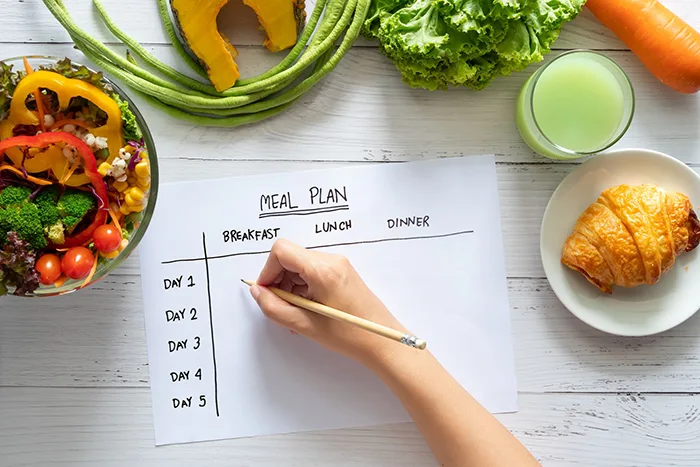Achieving a sustainable and healthy way to lose 1 kg a week (approximately 2.2 pounds) is a realistic and attainable goal for many individuals. With a combination of dietary changes, increased physical activity, and consistent effort, shedding those unwanted kilos can be done safely and efficiently. In this article, we’ll delve into effective strategies to help you confidently lose 1 kg a week.
How to Lose 1 kg a Week?
Calculate Your Caloric Needs
To lose weight, you must create a calorie deficit, meaning you consume fewer calories than your body needs to maintain its current weight. Calculate your Basal Metabolic Rate (BMR) and Total Daily Energy Expenditure (TDEE) to determine how many calories you should consume daily. Then, aim to reduce this calorie intake by approximately 1000 calories per day to achieve a 1kg weight loss in a week (lose 1 kg a week).
To lose 1 kg a week, you must create a calorie deficit of approximately 7,000 calories over a week. This means burning more calories through physical activity and consuming fewer calories through your diet.
1. Healthy Eating Habits
Mindful Eating:
Balanced Diet: Focus on a balanced diet that includes a variety of whole foods. Incorporate lean proteins, whole grains, fruits, vegetables, and healthy fats into your meals.
Portion Control: Be mindful of portion sizes. Use smaller plates to help control your portion sizes and prevent overeating.
Limit Sugary and Processed Foods: Minimize your intake of sugary snacks, processed foods, and beverages high in added sugars.
Listen to your body’s hunger cues, eating when hungry and stopping when satisfied.
Avoid eating in front of the TV or computer to stay aware of what you’re consuming.
Nutrient-Rich Foods:
Focus on whole, nutrient-dense foods like fruits, vegetables, lean proteins, whole grains, and healthy fats.
Limit your intake of processed foods, sugary snacks, and high-calorie beverages.
Meal Planning:
Plan your meals and snacks in advance to avoid impulsive, unhealthy choices.
Incorporate various foods to ensure you receive a wide range of essential nutrients.

2. Regular Exercise
– Aerobic Exercise:
- Engage in aerobic activities like walking, jogging, swimming, or cycling to lose 1 kg a week.
- Aim for at least 150 minutes of moderate-intensity aerobic exercise per week.
– Strength Training:
- Include resistance training exercises to build and maintain muscle mass.
- Two or more sessions of strength training per week are recommended.

3. Hydration
– Drink Plenty of Water:
- Staying hydrated helps support your metabolism and control hunger.
- Sometimes, thirst can be mistaken for hunger, leading to unnecessary snacking.
4. Monitoring and Accountability
– Keep a Food Diary:
- Track your daily food intake using a journal or a mobile app.
- This can help you identify eating patterns and areas where you can improve.
– Weekly Weigh-Ins:
- Weigh yourself once a week, ideally under consistent conditions, like in the morning after using the bathroom.
- This can help you track your progress and make necessary adjustments.
5. Sleep and Stress Management
– Prioritize Sleep:
- Aim for 7-9 hours of quality sleep per night.
- Inadequate sleep can disrupt hunger hormones and lead to overeating.
– Manage Stress:
- Explore stress-reduction techniques like mindfulness, yoga, or meditation.
- Stress can trigger emotional eating, so finding healthier ways to cope is essential.
6. Consultation with Professionals
- Consider consulting with a registered dietitian or healthcare professional.
- They can provide personalized advice, address any health concerns, and help you create a tailored plan.
sample meal plan to help you lose 1 kg a week
Here’s a sample meal plan to help you lose 1 kg a week (about 2.2 pounds), but keep in mind that individual calorie needs and dietary preferences may vary, so it’s essential to adjust the plan to fit your specific requirements:
Breakfast:
- Scrambled eggs (2 eggs) with spinach and cherry tomatoes.
- 1 slice of whole-grain toast.
- 1/2 cup of sliced strawberries.
Lunch:
- Grilled chicken breast (3 ounces) with a mixed green salad (lettuce, cucumbers, bell peppers) and a vinaigrette dressing.
- A small apple.
Snack:
- A Greek yogurt (6 ounces) with a sprinkle of berries.
Dinner:
- Baked salmon (3 ounces) with steamed broccoli and a small serving of quinoa (1/2 cup).
Snack:
- A handful of baby carrots with hummus (2 tablespoons).
It is important to keep in mind that weight loss should occur gradually and in a sustainable way. Extreme diets and fast weight loss can harm your health and often lead to regaining the weight lost. Instead, concentrate on making long-term lifestyle changes that you can sustain for a healthier and more satisfying life.

Frequently Asked Questions (FAQ) on How to Lose 1 kg a Week.
1. Is it safe to Lose 1 kg a Week?
- Yes, losing 1 kg(about 2.2 pounds) in a week is generally considered a safe and sustainable rate of weight loss for most people. However, it’s essential to consult with a healthcare professional before starting any weight loss program to ensure it’s appropriate for your individual health circumstances.
2. What is the key to losing Lose 1 kg a Week?
- The key to losing 1 kg a week is to create a calorie deficit by burning more calories through physical activity and consuming fewer calories through your diet. This deficit should amount to approximately 7,000 calories in a week.
3. What should I eat to lose weight at this rate?
- A balanced diet that includes lean proteins, whole grains, fruits, vegetables, and healthy fats is essential. Focus on portion control, avoid sugary and high-calorie foods, and prioritize nutrient-dense options.
4. How important is portion control when trying to lose weight?
- Portion control is crucial. Be mindful of serving sizes to prevent overeating and stay within your calorie goals. Smaller plates and utensils can help with portion control.
5. How often should I exercise to achieve this goal (lose 1 kg a week)?
- Aim for at least 150 minutes of moderate-intensity aerobic exercise per week, along with strength training exercises on two or more days. Consistency in your exercise routine is key.
6. Do I need to count calories?
- Counting calories can be a helpful tool to ensure you are in a calorie deficit, but it’s not the only approach. Paying attention to portion sizes and making mindful food choices can also contribute to weight loss.
7. Should I avoid all carbs to lose weight?
- No, you don’t need to eliminate all carbohydrates. Instead, focus on consuming complex carbohydrates like whole grains, which provide sustained energy and are more filling.
8. Can I lose weight without exercising?
- While it’s possible to lose weight by solely adjusting your diet, incorporating regular exercise into your routine has many health benefits and can accelerate your weight loss efforts.
9. Is it safe to follow a 1,200-calorie diet?
- A 1,200-calorie diet can be safe and effective for weight loss when properly planned and supervised by a healthcare professional or dietitian. It’s important to ensure you still get all essential nutrients.
10. How important is sleep in this process?
- Adequate sleep (7-9 hours per night) is crucial for weight loss. Poor sleep can disrupt hormones that regulate hunger and appetite, making it more challenging to control your calorie intake.
11. What if I’m not losing weight at the expected rate?
- Weight loss (lose 1 kg a week) can vary from person to person and week to week. Plateaus are normal. If you’re consistently not seeing results, consult with a healthcare professional or registered dietitian for guidance.
In conclusion, achieving to lose 1 kg a week is achievable through a combination of healthy eating and regular physical activity. It’s essential to be patient with yourself, stay consistent, and seek professional guidance when needed. By following these strategies, you can embark on a successful and sustainable weight loss journey.
Related: Avoid These 12 Common Mistakes on Your Weight Loss Journey!
Related: Incredible Benefits of Fasting and How to Get Started










